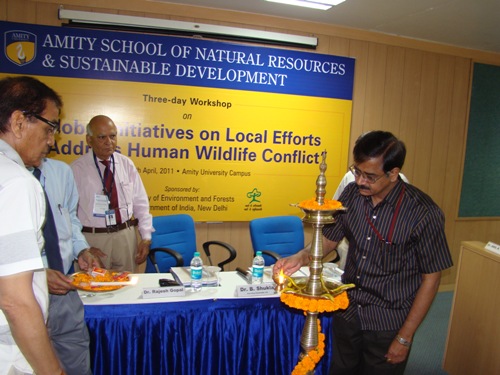06 Apr 2011|Noida | Amity University Uttar Pradesh
Three Day Workshop on ‘Global Initiatives on Local Efforts to Address Human Wildlife Conflict’ kickstarts at Amity

A three day workshop (6th – 8th April, 2011) on
‘Global Initiatives on Local Efforts to Address Human Wildlife Conflict’ is being organized by
Amity School of Natural Resources & Sustainable Development (ASNRD) at Amity University Campus, Sector – 125, Noida. The workshop aims at creating a road map towards helping wildlife managers, conservationists and stakeholders for resolving conflicts and offering options, lessons learned through case studies and comparative evaluation of existing techniques and tools.
Delivering his welcome address during the inauguration of the workshop
Dr. J.C Kala, Director General, Amity Institute of Global Warming and Ecological Studies (AIGWES) said “Considering the current human population growth rate, the increasing demand for natural resources and growing pressure for access to land, it is evident that the human wildlife conflict will not be eradicated in the near future but will grow continuously.” He added “Conflict alleviation is a two-sided equation as both wildlife and people are in conflict. The goal is thus to enable coexistence and sharing of resources on some scale, which is best achieved by addressing both sides of the equation and finding a balance between conservation priorities and the needs of people who live with wildlife, therefore there is great need to increase local community’s tolerance for wildlife and also adaptation of human landscape.”
Presenting his inaugural address
Dr. Rajesh Gopal, Member Secretary, NTCA, New Delhi stated “This workshop assumes great significance in bridging the gap between scientific knowledge and wildlife management in order to control and minimize human animal conflicts.” Elaborating further on the cause and effect of the human animal conflict he said “India’s growing population can be a great obstacle for wildlife conservation but the people can also play a vital role in species conservation. Community based conservation initiatives are long term solutions to managing human wildlife conflicts all across the world. The dire situation essentially calls for helping people realize that they are valuable stakeholders and providing them with incentives which will motivate them to conserve wildlife and its habitat. Reduction in the conflict between wildlife and people is likely to improve food security by reducing wildlife’s impacts on crops and livestock and Biodiversity Conservation by modifying the negative attitudes that many communities have towards wildlife.”
A cluster of informative and enlightening technical sessions on “Tiger Conservation and Conflict Management in India” by Dr. Rajesh Gopal, “Human Wildlife Conflict Mitigation in the NCR” by Dr. Kartick Satyanarayan, Co – Founder of Wildlife SOS, New Delhi, “Impacts of Human Wildlife Conflict on Human Lives and Livelihood” by Dr. V. K Melkani, Addl. Principal Chief Conservative of Forest (PCCF) and Head LLPM Deptt, Wildlife Institute of India, Dehradun, “Human Wildlife Conflict Mitigation in Three WWF Landscapes: Lessons Learnt and the way Forward” by Dr. Dipankar Ghose, Head – Eastern Himalaya and Terai Programme, WWF – India, New Delhi, “Mining : A Catalyst for Human Wildlife Conflict – A Case Study” by Dr. R.K Singh, WWF-India, New Delhi, “Policies for Reducing Human Wildlife Conflict” by Ms. Prakriti Srivastava, Deputy Inspector General (WL), Ministry of Environment and Forests, New Delhi, “Social Aspect on Human Wildlife Conflict” by Dr. Birbal Jha, Managing Director, British Lingua, New Delhi, “Wildlife Conservation and Management in India” by Mr. P. K Sen, Ex – Director, Project Tiger, Government of India, New Delhi, “Wildlife within Indian Villages – How could they survive for so long?” by Dr. Silanjan Bhattacharya, Professor, West Bengal State University, Kolkata and “Crop Depredation by Wild animals and Mitigation Strategies” by Dr. N.P.S Chauhan, Scientist F, Wildlife Institute of India, Dehradun will unfold during the three day workshop.